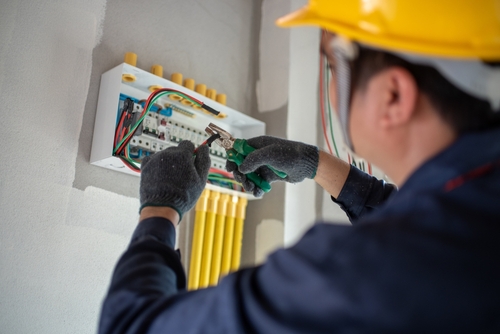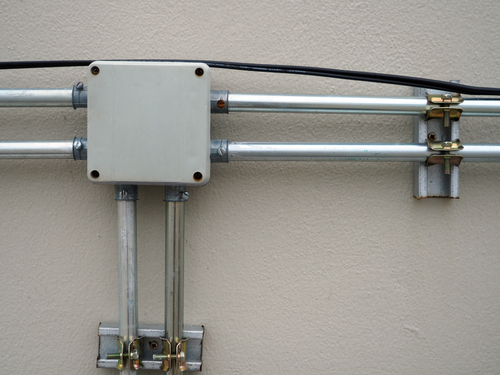Key Takeaways:
- Essential Safety Shield: Metal junction boxes contain heat, prevent sparks from reaching flammable materials, and comply with NEC safety codes.
- Durable and Reliable: Metal boxes outperform plastic alternatives, making them ideal for both residential and commercial applications.
- Professional Installation Matters: Proper mounting, sealing, and sizing by licensed electricians ensure maximum safety and functionality.
- Proactive Maintenance: Regular inspections and complementary safety systems like GFCIs and smoke detectors enhance overall electrical safety.
Safety begins with knowledge—and metal junction boxes are a cornerstone of a secure electrical system. In this guide, you’ll learn why proper enclosures matter, how they prevent fires and shocks, and when it’s time to call a professional. Educate yourself and protect your property.
Electrical safety is not just a buzzword—it’s a necessity. Whether you’re a homeowner planning renovations, a business owner managing operations, or a DIY enthusiast tackling your first wiring project, understanding the critical role of a metal junction box can protect your property and even save lives.
This guide explores why metal junction boxes are vital to any electrical system, the dangers they mitigate, and how proper installation and maintenance ensure unparalleled safety.
The Hidden Dangers of Electrical Connections
Did you know that behind every electrical outlet or switch lies a complex web of wires and connections? Most of us never think about what goes on inside our walls, but these unseen electrical components can pose significant risks if improperly managed.
Common Risks in Electrical Systems:
- Loose or Exposed Wires
Poorly connected or uninsulated wires can overheat, causing sparks or even fires.
- Short Circuits
Electricity searching for the “wrong route” can generate heat and damage appliances—or worse, lead to fires.
- Ignored Regulations
Failing to meet electrical codes with improper wiring can result in major safety violations.
This is where the humble metal junction box comes into play.
Why Metal Junction Boxes are Critical
A metal junction box is not merely a container for your electrical connections. It’s a safeguard shielding your home, business, or workspace from potential disasters.
Key Benefits of Metal Junction Boxes:
- Heat Containment
Electrical connections generate heat, especially when wires splice together or when equipment runs at higher loads. A metal junction box traps this heat within its fire-resistant enclosure, preventing it from reaching flammable materials.
- Barrier Against Combustible Construction Materials
Materials like wood, drywall, and insulation are inherently flammable. The metal enclosure acts as a shield, stopping sparks from igniting these materials.
- Compliance with Electrical Safety Codes
Under the National Electrical Code (NEC), wire splices must always be enclosed within approved junction boxes. Failing to comply doesn’t just risk penalties—it risks lives.
- Durability and Longevity
Metal boxes outperform plastic alternatives in handling heavy-duty usage, making them an excellent choice for both residential and commercial installations.
Types of Junction Boxes and Their Applications
Not all junction boxes are created equal. Here’s how they’re tailored for different environments and needs.
Residential Junction Boxes
These boxes are typically installed for:
- Electrical outlets
- Light switches
- Ceiling fixtures
- Basement or attic wiring
Commercial Junction Boxes
Commercial and industrial settings require robust solutions:
- Heavy-duty Metal Boxes for large-scale buildings
- Weatherproof Enclosures for outdoor installations
- Heat-resistant Boxes for factories or warehouses where high temperatures are common
Beyond Basic Protection: What You Should Know
While metal junction boxes provide an essential layer of safety, they work best when paired with proper installation, maintenance, and other safety measures.
Proper Installation is Essential
A junction box that isn’t mounted securely, sealed properly, or sized correctly can compromise safety. Hiring a licensed electrician ensures everything is done right the first time.
Regular Inspections
Electrical systems aren’t “set it and forget it” technologies. Routine inspections by professionals can identify loose wires, deteriorated materials, or other hidden dangers before they escalate.
Complementary Systems for Enhanced Safety
Metal junction boxes are part of a broader safety framework. Complement them with the following systems:
- Hard-wired smoke detectors with backup power
- Ground Fault Circuit Interrupters (GFCIs) to prevent electrical shocks
- Breakers that trip automatically in overload situations

Trusting Licensed Electricians for Complex Installations
When dealing with codes, high voltages, or unique construction challenges, it’s crucial to work with state-certified electricians. For example, companies with a State-Wide Master’s License (like Scott Electric in Missouri) bring peace of mind with their professionalism and expertise.
The Value of Professionals:
- Comprehensive understanding of local and national electrical codes
- Proper installation that ensures safety and functionality
- Solutions tailored to unique home or commercial needs
Electrical Safety as an Investment
Investing in proper electrical safety isn’t an extra expense—it’s a guarantee that protects your home, business, and loved ones. Consider this: the cost of a high-quality metal junction box and professional installation pales in comparison to the price of recovering from a fire or electrical failure.
Additional Recommendations for Owners:
- Install hard-wired alarms for consistent, interconnected alerts
- Replace outdated electrical systems with modern, energy-efficient wiring
- Use durable, code-compliant components in all installations
Actionable Steps for Homeowners and Business Owners
Stay proactive and reduce your electricity-related risks with these steps:
- Book Regular Inspections
Schedule annual checks with certified electricians to prevent potential hazards.
- Ensure Proper Enclosures
Confirm all electrical connections are housed in safe, code-compliant junction boxes.
- Avoid DIY for Complex Installations
Leave the hard stuff to professionals to ensure safety and functionality.
- Educate Yourself
Read about best practices and advancements in electrical safety to stay informed.
- Choose Trusted Professionals
Work with licensed electricians who bring experience, reliability, and adherence to standards.
Take Charge of Electrical Safety Today
Metal junction boxes are small but mighty protectors in electrical safety, making them indispensable in both residential and commercial settings.
Is your home or office equipped with compliant junction boxes? Or maybe you’re undertaking a renovation and need expert advice? Contact state-licensed electricians, like Scott Electric, to inspect, upgrade, or install the right safety measures for your property today. Remember, electrical safety is never an accident—it’s intentional, informed, and proactive. Take the first step now to secure what matters most.
Your Trusted Columbia Electricians
When you need a licensed electrician in Columbia, Missouri, count on Scott Electric for fast, reliable service. We specialize in both residential and commercial electrical work—from troubleshooting and panel upgrades to lighting installation and generator setup.
Backed by years of experience and a commitment to safety, our team is proud to serve homeowners, business owners, and contractors throughout Columbia and the surrounding area.
🔌 Locally owned. Fully licensed. Always dependable.
📞 Get a free quote from your local Columbia electrician today.
FAQ: Metal Junction Boxes and Electrical Safety
Q: What is a metal junction box?
A: A metal junction box is an enclosure that houses electrical connections, protecting against heat, sparks, and other hazards while ensuring compliance with safety codes.
Q: Why are metal junction boxes better than plastic ones?
A: Metal boxes are more durable, fire-resistant, and suitable for heavy-duty or high-temperature environments, making them a safer choice for many applications.
Q: Are metal junction boxes required by code?
A: Yes, the NEC requires all wire splices to be enclosed in approved junction boxes, and metal boxes are often preferred for their durability and safety.
Q: Can I install a metal junction box myself?
A: While basic installations may be manageable for experienced DIYers, complex or high-voltage installations should always be handled by licensed electricians to ensure safety and compliance.
Q: How often should I inspect my electrical system?
A: Schedule professional inspections annually to identify and address potential hazards like loose wires, deteriorated materials, or outdated components.
Q: What other safety measures complement metal junction boxes?
A: Hard-wired smoke detectors, GFCIs, and circuit breakers enhance safety by preventing shocks, fires, and overloads.
Q: Why should I hire a licensed electrician for installations?
A: Licensed electricians ensure proper installation, adherence to codes, and tailored solutions for your specific needs, reducing risks and enhancing safety.

